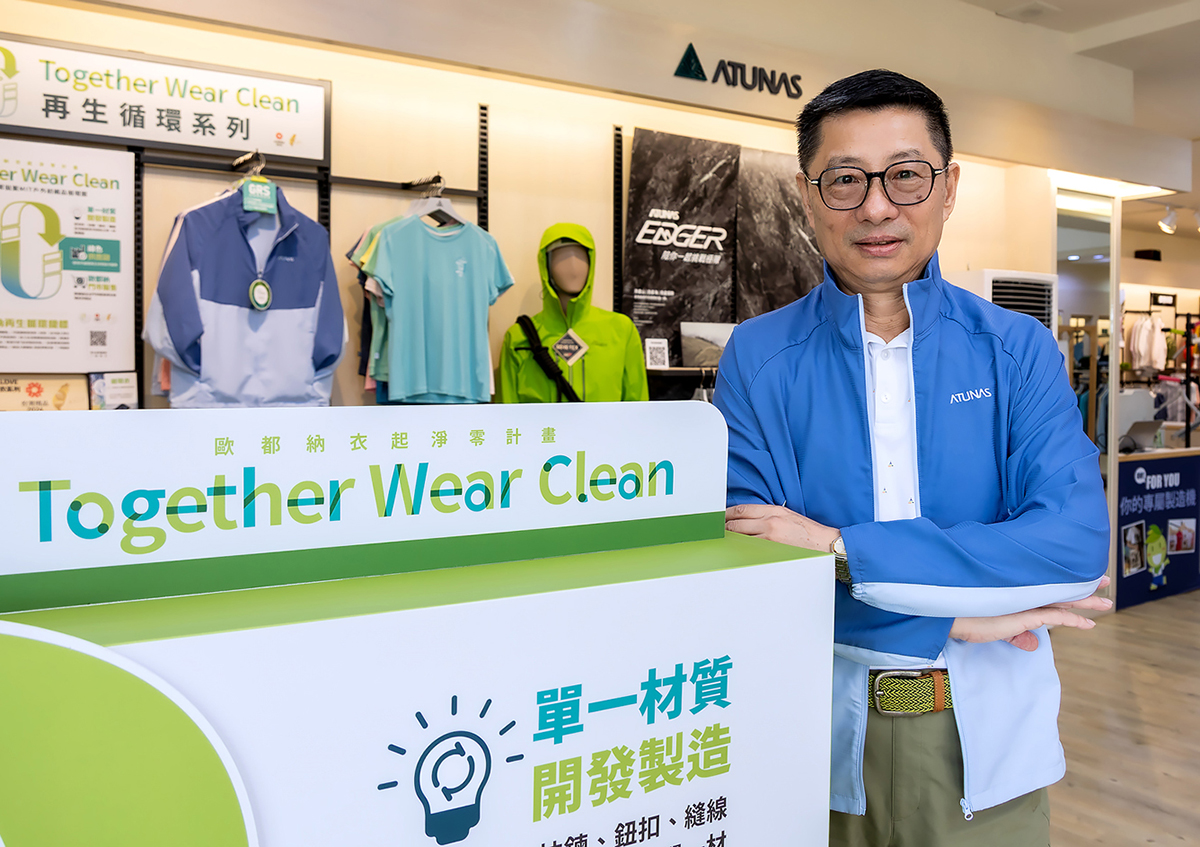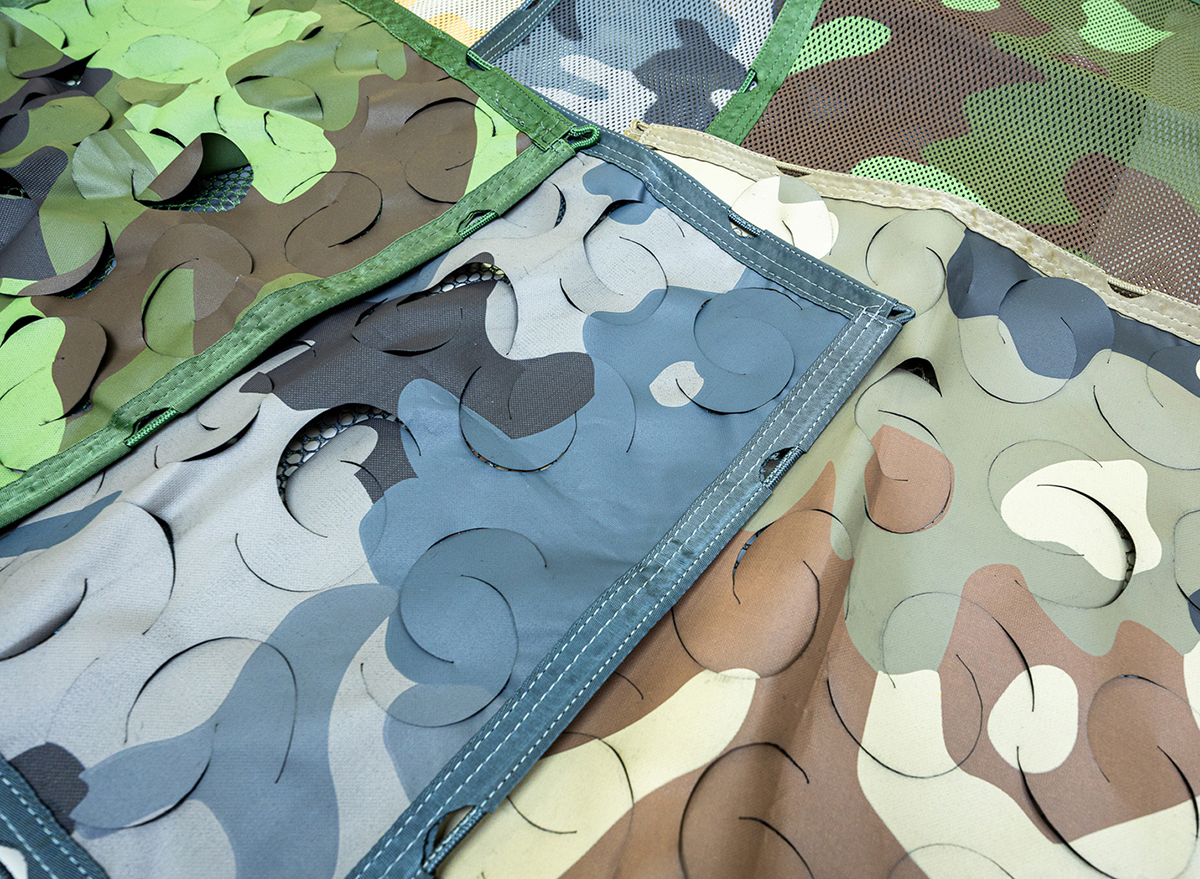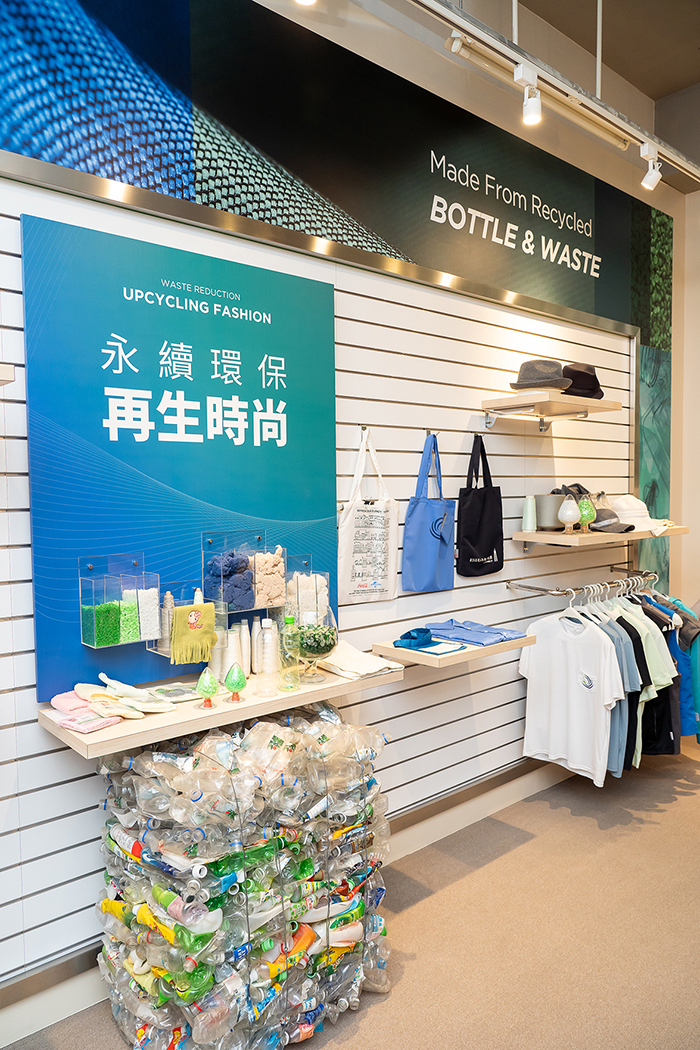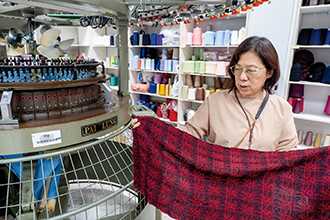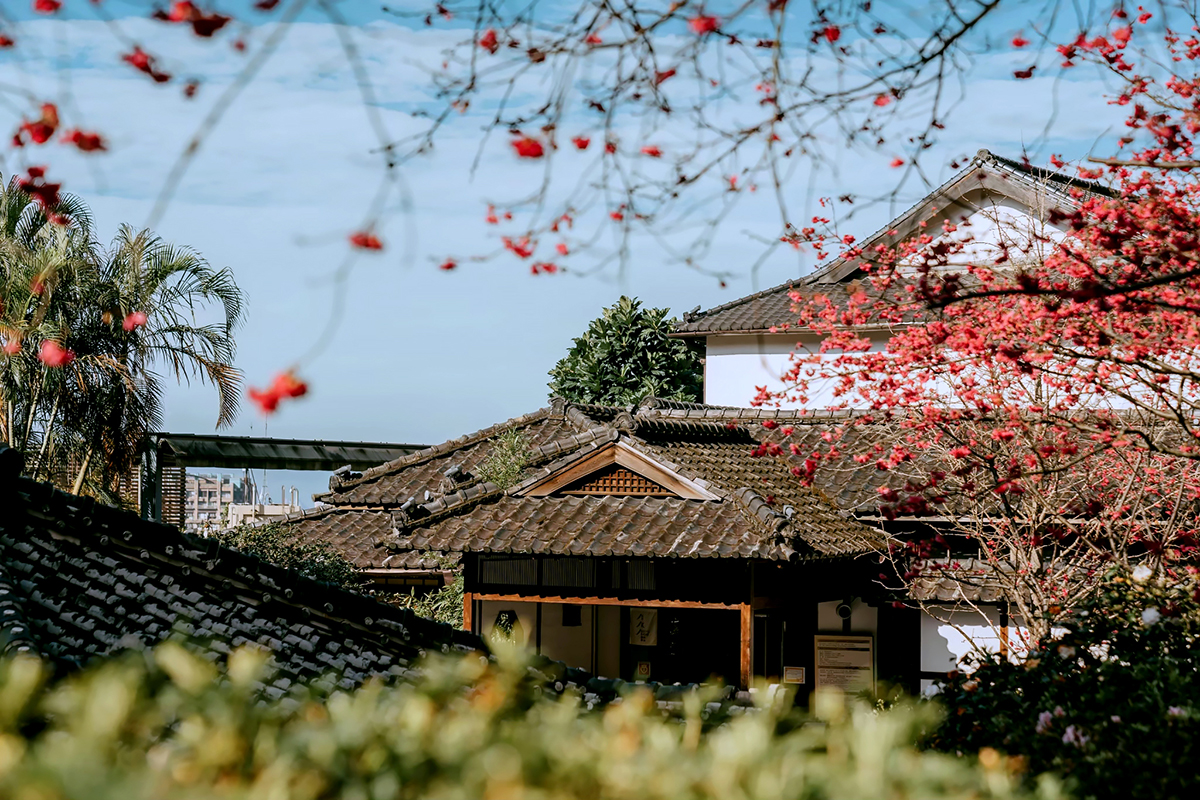Taiwan dominates supply chains in the burgeoning field of functional textiles. Each summer the Han Kuang military exercises take place across Taiwan....
Vous n'êtes pas connecté
Rubriques :
 - TAIWANTODAY.TW - Taiwan Review - 01/Aug 00:00
- TAIWANTODAY.TW - Taiwan Review - 01/Aug 00:00
Cyclical Design
The circular economy model epitomizes sustainability in the textiles industry. Atunas Chair Chen Kun wears an Atunas monomaterial jacket, polo shirt and pants at an outlet store in central Taiwan’s Changhua City. (Photo by Chen Mei-ling)In spring and summer Chen Kun (程鯤) can be spotted around his hometown in central Taiwan’s Changhua County wearing clothes typical of his demographic: pants, a polo shirt and a lightweight jacket. These unremarkable items are in fact a dream come true for the chair of Changhua-headquartered Sun Own Industrial Co. His company’s sports and outdoor activity apparel brand, Atunas, makes the entirety of each of its garments—cloth, buttons and zippers—of the same raw material, making them easier to recycle into new fabric. “Monomaterial production minimizes waste and encourages reuse,” Chen said. “We’re all responsible to future generations, so we do our part to reduce harm to the environment.” Chen chairs the Textile Circular League (TCL), established last year under the auspices of the Ministry of Environment’s Resource Circulation Administration (RECA). The league now comprises more than 90 companies across the country working in branding, manufacture, sales and recycling, as well as academic institutions and government-supported organizations like New Taipei City-based Taiwan Textile Research Institute (TTRI). The TCL works in line with Taiwan’s Pathway to Net-Zero Emissions in 2050, released in 2022 by the Cabinet-level National Development Council, by prompting transition in the energy, industrial, lifestyle and social spheres to enhance national competitiveness. Zero-waste resource recycling is among the plan’s key strategies, and the circular model in textiles is a crucial vector for achieving environmental stability, alongside similar schemes in fields such as construction, food, electronics and plastics. Remarking on TCL’s creation, Deputy Environment Minister Shen Chih-hsiu (沈志修) drew attention to international trends, notably the textile-to-textile approach specified in the EU 2030 Strategy for Sustainable and Circular Textiles to incorporate eco-friendly ideas throughout a product’s entire life cycle. RECA Director General Lai Ying-ying (賴瑩瑩) said the league forges a stable, reliable channel for exchanges between the government and business sectors. She cited uniform purchase programs for enterprises, government units and schools as one of the most accessible methods of promoting the circular textile economy: organizations can choose products that adopt green design principles such as monomaterial fabrics and ensure subsequent maintenance and recycling services. Second Chance Wu Hsiao-ting (吳筱婷), a section chief within RECA, said that with fast fashion still in vogue, there is rapid turnover as consumers seek novelty. “In recent years the domestic secondhand clothing business has seen a downturn in exports, with a large quantity of remaining stockpiles to be dealt with,” she said. Breaking them down to their component fibers for reuse is the best option for handling the surplus. Li Jo-hwa (李若華), deputy director of TTRI’s Department of Testing and Certification, traced the league’s origin to a 2019 project by the institute on end-stage treatment of post-consumer textile waste, conducted in collaboration with the Ministry of Environment.Atunas stores sell garments that meet the Global Recycled Standard and entice customers to turn in used clothes by offering reward points. (Photo by Chen Mei-ling)Li noted that around the same time, the government launched the five-plus-two industrial innovation program covering biotech, green energy, national defense, smart machinery and the Internet of Things, as well as agricultural development and the circular economy. Consequently, TTRI set up a textile lab in 2020 to build links among the industry’s manufacturers and recyclers. “We wanted these different stakeholders to know each other’s plans, progress and what problems they’re facing,” Li said. “This allows us to identify major issues and difficulties facing circular textile development and production, which can then be addressed and overcome with the combined resources and ingenuity of lab members.” Significantly, she added, the textile industry associations in such fields as dyeing, knitting, weaving and manmade fiber also joined the platform that formally took shape as the TCL in July 2024.Deputy Environment Minister Shen Chih-hsiu, sixth left, and the ministry’s Resource Circulation Administration Director General Lai Ying-ying, sixth right, attend the launch ceremony in Taipei City for the Sustainable Fashion League, a part of the Textile Circular League. (Courtesy of Textile Circular League)Fashion Forward TCL includes the Sustainable Fashion League, a subdivision of brand owners and department store operators that represents the industry’s customer-facing downstream sector. One prominent member is the Pacific Sogo Department Stores Co. from Taipei City-headquartered Far Eastern Group. Its synthetic fiber-making company Far Eastern New Century Corp. and Kaohsiung City-based Nan Ya Plastics Corp. are both TCL members and leaders in making eco-friendly fabrics from recycled polyethylene terephthalate (PET) bottles. Li applauded Pacific Sogo and other department stores that focus on environmental, social and governance considerations for their circular textile-related incentives, such as offering customers reward points for turning in used clothes. The gathered apparel is sorted, with wearable items going to social welfare groups and reusable materials like polyester going to companies like Nan Ya for processing.Garments and accessories in New Taipei City-based UKL Enterprise Co.’s Ownlife series utilize pineapple leaf fibers as a sustainable solution. (Photo by Chen Mei-ling)Since the early 2020s through the TTRI-initiated lab program, the Kaohsiung firm, Sun Own and other domestic textile manufacturers in the up-, mid- and downstream sectors have collaborated closely to develop monomaterial fabrics designed to enhance recyclability. “Otherwise, it’s quite troublesome to separate a garment’s different components, each of which in turn can be further separable,” Atunas’ Chen said. “For instance, a zipper may combine metal, nylon cloth and fiber-reinforced plastic parts.” In 2023 Atunas released its first monomaterial apparel model composed of recycled polyester fabrics from PET bottles, secondhand clothing and textile leftovers, and now around 80 percent of the brand’s pants, shirts and light jackets are monomaterial. “We’ll go on likewise with the autumn and winter series of items like warm coats and sleeping bags as our upstream partners work out the required recycling techniques,” the chair said. A display at the Resource Circulation Upgrading Center in Taipei illustrates the stages of transforming plastic bottles into yarn. (Photo by Chen Mei-ling)Coming Together In June Chen presided over the TCL’s first general meeting of member companies and organizations at the RECA-overseen Resource Circulation Upgrading Center in Taipei. The accompanying exhibition featured results and plans from accomplished league members such as TTRI, Sun Own, Nan Ya and New Taipei-based UKL Enterprise Co. The latter has made its mark in recent years by turning pineapple leaves into textile fibers. “We helped UKL test and confirm the strength of the popular Tainung No. 17 variety’s fibers in comparison with other domestic and foreign cultivars,” TTRI’s Li said. Utilizing an agricultural byproduct that would otherwise be burned, the garment manufacturing company has expanded its scope to create a fashion series named Ownlife, pronounced like the word for “pineapple” in Taigi, also known as Taiwanese.Secondhand clothing and textile leftovers are the raw materials for sustainably produced items. (Photo by Chen Mei-ling)“At Atunas, we aim to incorporate a circular life cycle from the very beginning of the design period,” Chen said. This can be an artificial intelligence-assisted process to create an optimal zero-waste design, according to RECA’s Wu. “It’s a revelatory step because roughly 80 percent of a garment’s environmental footprint is determined during the design process, which influences whether it ends up as waste or gets recirculated,” she said. Raising consumer awareness, she added, must go hand in hand with offering a wider range of recyclable products that are both affordable and compliant with international benchmarks like the Global Recycled Standard. To this end, Chen sees the TCL as vital to the coordinated endeavor to mainstream a circular economy model in the textile industry, enable certifications for manufacturing processes and products, as well as promote public educational campaigns. “Whenever I put on clothing from our recycled line, I reinforce the message that there is treasure to be found through responsible use of all of our resources,” he said. Write to Pat Gao at cjkao@mofa.gov.tw
Articles similaires
Fiber Ingenuity
Taiwan’s textile industry blends sustainability, innovation and smart technology. At 83, Alex Lo (羅忠祐) remains as forward-thinking as ever as...
Future Function
Taiwan spins its textile past into a high-tech tomorrow. Smart textiles are rapidly transforming the way we think about clothing by merging fashion...
MOENV stages exhibition on plastic’s life cycle
The Ministry of Environment Resource Circulation Administration (RECA) hosted a plastic life cycle exhibition Aug. 1-Sept. 13 in Taipei City,...
MOENV stages exhibition on plastic’s life cycle
The Ministry of Environment Resource Circulation Administration (RECA) hosted a plastic life cycle exhibition Aug. 1-Sept. 13 in Taipei City,...
Cutting Edge
Thoughtful design created with sustainable fabrics makes a positive impact on catwalks. Taiwan has built an international reputation for turning raw...
Cutting Edge
Thoughtful design created with sustainable fabrics makes a positive impact on catwalks. Taiwan has built an international reputation for turning raw...
Cultural Spring
A historic Beitou site is a source of memories that forges new international connections. Earlier this year, the Ministry of Culture designated 110...
Textile workers ask FG to implement Executive Order 003
The National Union of Textile, Garment, and Tailoring Workers of Nigeria (NUTGTWN) has called on the government at all levels to implement the...
Textile workers ask FG to implement Executive Order 003
The National Union of Textile, Garment, and Tailoring Workers of Nigeria (NUTGTWN) has called on the government at all levels to implement the...
Les derniers communiqués
-
COMPUTEX 2025: MiTAC Powers Sustainable AI Data Centers with New Server & Cooling Tech
MiTAC Computing Technology Corp - 24/05/2025
